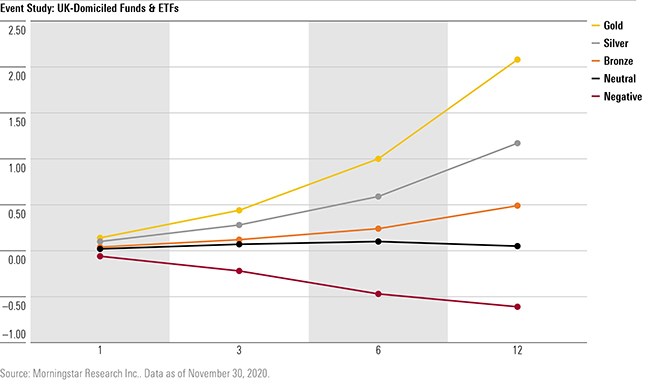
In 2018, Morningstar launched the Morningstar Quantitative Ratings (MQR) for funds for the UK Market. And now, we are launching an analysis report to go with it, a written analysis that will help investors contextualize the existing MQR.
Morningstar’s Quantitative Rating (MQR) is distinct from our “Star Rating.” Where the Star Rating is a backwards-looking view of after-fee risk adjusted performance, the MQR is our assessment of a fund’s ability to outperform peers in the future.
The MQR is steeped in the roots of our analyst framework, which assesses three core pillars of a fund: people, process, and parent. We believe that each of these pillars contribute to a fund’s ability to achieve excess returns over time. The framework is style agnostic – for equity strategies, we do not prefer value to growth or momentum, or vice versa, and for fixed-income strategies, both high-quality and credit-sensitive styles are viable and neither negotiate preferential treatment.
The Three Pillars
1. People
The quality of portfolio management teams is a significant key to a strategy’s ability to deliver superior performance relative to its benchmark and/or peers. Evaluating an investment team requires an evaluation of the individuals who make the key decisions on the portfolio; if there is more than one person in charge, how conflicts are resolved; resources that directly support the managers’ work on the strategy; other resources that are not part of the team; the expertise and relevance of available resources to the strategy; and how incentive pay influences decision-making and team stability.
2. Process
Here, Morningstar seeks out strategies with a performance objective and investment process (for both security selection and portfolio construction) that is sensible, clearly defined, and repeatable in implementation. We seek to understand the context in which managers think about risk and how this is expressed when constructing the portfolio. We look for strategies with a process distinctive enough to generate standout results in the future.
3. Parent
The parent firm sets the tone for key elements of our evaluation, including capacity management, risk management, recruitment and retention of talent, as well as factors like incentive pay which can drive or impede the alignment of the firms’ interests with those of fund investors. With a mission to empower investor success, Morningstar prefers that firms have a culture of stewardship rather than those that are heavily weighted to salesmanship. Firms focused too narrowly on sales opportunities tend to offer faddish products in an attempt to gather assets and have higher charges and incentive programs that do a poor job of aligning managers’ interests with investors.
Putting it Together
Morningstar leverages the experience of our global analyst teams and combines it with a machine learning model that uses key datapoints representing each of the pillars to accurately predict what an analyst would rate a fund given a finite set of objective information.
Our tracking indicates that the ratings are effective. Funds that were higher rated (Gold, Silver, Bronze) outperformed funds with lower ratings (Neutral, Negative) over multiple rolling periods after receiving the rating.

On average, gold rated funds outperform their category averages by close to 2.1 percentage points in the 12 months after the rating (measuring all 12-month periods from May 2018 through to November 2020). On the other hand, negatively rated funds on average underperformed their category average by 0.6 percentage point on the same basis. Investors would be served well to consider the MQR when choosing a fund within a category.
We understand that investors will need context into why a fund was given a specific rating, without having to know the inner workings of a machine learning algorithm. The MQR Analysis report will provide this context and will help investors understand key factors considered when arriving at the MQR.



























